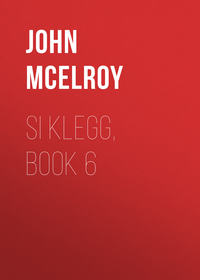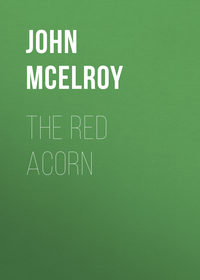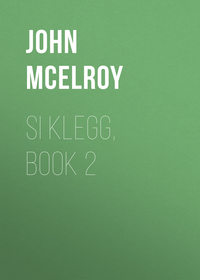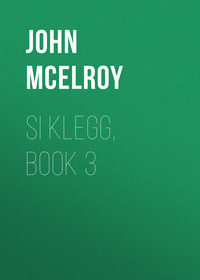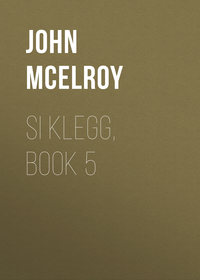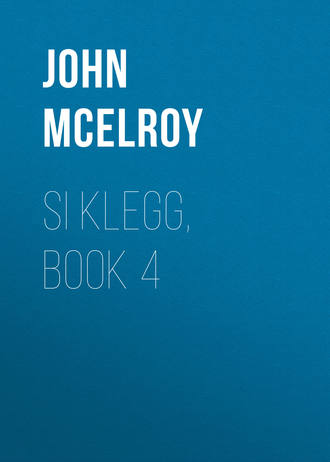 полная версия
полная версияSi Klegg, Book 4
"Josiah Nott killed Hospital at Chattanooga badly wounded E. C. Bower's ox. What on airth does that mean? I can't for the life o' me make it out."
"Read it over again, pap," said Maria, suddenly drying her eyes.
The father did so.
"Le' me read it, pap," said Maria, snatching the telegram from his hand. "Josiah," said she, read ing. "That's Si's right name."
"Certainly it is," said her mother, reviving.
"Certainly; I didn't think o' that before," echoed the father.
"Josiah not killed," continued she. "Good heavens, that's what that means. They rebels has got hold o' the wires, and shook 'em and tangled up the rest, but the beginnin's all straight."
"I believe that Sam Elkins down at the station 's mixed it up," said Sophia, with hope springing in her breast. "He never can get things straight. He was in the class with me when I went to school, and too dumb to come in when it rained. He was the worst writer, speller and reader in the school. Think o' him being a telegraph operator. Why, he couldn't spell well enough to make tally-marks on a door when you're measurin' corn. Railroad was mighty hard up for help when it hired him. Let me read that dispatch. 'Josiah not killed.' That means Si Klegg, as sure's you're born. It can't mean nothin' else, or it wouldn't be addressed to you, pap. 'Hospital at Chattanooga.' Chattanooga's near where the battle was fought. 'Badly wounded.' That means Si's bin shot. 'E. C. Bower's ox.' What in the world can that be?"
"Bowersox?" said her father, catching the sound. "Why, that's the name o' the Lootenant Si and Shorty was under when they came home. Don't you remember they told us about him? I remember the name, for a man named Bowersox used to run a mill down on Bean-Blossom Crick, years ago, and I wondered if he was his son. He's sent me that dispatch, and signed his name. The Lord be praised for His never-endin' mercies. Si's alive, after all. Le' me read that over again."
He took the dispatch with shaking hands, but there was too much mist on his glasses-, and he had to hand it back to Maria to read over again to convince himself.
"I'll tell you what let's do: Let's all get in the wagon and ride over to the station, and get Sam Elkins to read the dispatch over again," suggested Sophia. "I'll jest bet he's mummixed it up."
"Don't blame him, Sophy," urged Maria. "I think the rebels has got at the poles or wires and shook 'em, and mixed the letters up. It's just like 'em."
Sophy's suggestion was carried out. Abraham Lincoln was directed to get out the spring wagon, and the Deacon helped hitch up, while the "women folks" got ready.
While they were at the station getting Sam Elkins to re-examine the dots and dashes on his strip of paper, the Eastern express arrived, bringing the morning papers. The Deacon bought one, and the girls nervously turned to the war news. They gave a scream of exultation when they read the revised returns of the killed and wounded, and found under head of "Wounded, in Hospital at Chattanooga":
"Corporal Josiah Klegg, Q, 200th Ind.
"Private Daniel Elliott, Q, 200th Ind."
"Mother and girls, I'm goin' to Chattanoogy on the next train," said the Deacon.
It was only a few hours until the train from the East would be along, and grief was measurably forgotten in the joy that Si was still alive and in the bustle of the Deacon's preparation for the journey.
"No," he said, in response to the innumerable suggestions made by the mother and daughters. "You kin jest set all them things back. I've bin down there once, and learned something. I'm goin' to take nothin with me but my Bible, a couple o' clean shirts, and my razor. A wise man learns by experience."
Mother and girls were inconsolable, for each had something that they were sure "Si would like," and would "do him good," but they knew Josiah Klegg, Sr., well enough to understand what was the condition when he had once made up his mind.
"If Si and Shorty's able to be moved," he consoled them with, "I'm going to bring them straight back home with me, and then you kin nuss and coddle them all you want to."
The news of his prospective journey had flashed through the neighborhood, so that he met at the station the relatives of most of the men in Co. Q, each with a burden of messages and comforts for those who were living, or of tearful inquiries as to those reported dead.
He took charge of the letters and money, refused the other things, and gave to the kin of the wounded and dead sympathetic assurances of doing every thing possible.
He had no particular trouble or advanture until he reached Nashville. There he found that he could go no farther without procuring a pass from the Provost-Marshal. At the Provosts's office he found a highly miscellaneous crowd besieging that official for the necessary permission to travel on the military railroad. There were more or less honest and loyal speculators in cotton who were ready to take any chances in the vicissitudes of the military situation to get a few bales of the precious staple. There were others who were downright smugglers, and willing to give the rebels anything, from quinine to gun-caps, for cotton. There were sutlers, pedlers, and gamblers. And there were more or less loyal citizens of the country south who wanted to get back to their homes, some to be honest, law-abiding citizens, more to get in communication with the rebels and aid and abet the rebellion.
Deacon Klegg's heart sank as he surveyed the pushing, eager crowd which had gotten there before him, and most of whom were being treated very cavalierly by the Provost-Marshal.
"No," he heard that official say to a man who appeared a plain farmer like himself; "you not only can have no pass, but you can't stay in Nashville an other day. I remember you. I've heard you tell that story of a sick son in the hospital before. I remember all the details. You haven't changed one. You're a smuggler, and I believe a spy. You've got mule-loads of quinine somewhere in hiding, and may be gun-caps and other munitions of war. If you know what's good for you, you'll take the next train north, and never stop until you are on the other side of the Ohio River. If you are in town to-morrow morning, I'll put you to work on the fortifications, and keep you there till the end of the war. Get out of my office at once."
Others were turned away with similar brusqueness, until the Deacon was in despair; but the though of Si on a bed of pain nerved him, and he kept his place in the line that was pushing toward the Provost's desk.
Suddenly the Provost looked over those in front of him, and fixing his eye on the Deacon, called out:
"Well, my friend, come up here. What can I do for you?"
The Deacon was astonished, but in obedience to a gesture from the Provost, left the line, and came up.
"What's your name? Where are you from? What are you doing down here? What do you want?" inquired the Provost, scanning him critically.
The Deacon's eyes met his boldly, and he answered the questions categorically.
"Well, Mr. Klegg, you shall have a pass at once, and I sincerely hope that you will find your son recovering. You probably do not remember me, but I have seen you before, when I was on the circuit in Indiana. My clerk there is writing out a pass for you. You will have to take the oath of allegiance, and sign the paper, which I suppose you have no objection to doing."
"None in the world," answered the Deacon, surprised at the unexpected turn of events. "I'll be only too glad. I was gittin' very scared about my pass."
"O, I have hard work here," said the Provost smiling, "in separating the sheep from the goats, but I'm now getting to know the goats tolerably well. There's you're pass, Deacon. A pleasant journey, and a happy termination to it."
The Deacon took out his long calf-skin wallet from his breast, put the precious pass in it, carefully strapped it up again and replaced it, and walked out of the office toward the depot.
He had gone but a few steps from the building when he saw the man who had been ordered out of the city by the Provost, and who seemed to be on the lookout for the Deacon. He came up, greeted the Deacon effusively and shook hands.
"You're from Posey County, Ind., I believe? I used to live there myself. Know Judge Drake?"
"Very well," answered the Deacon a little stiffly, for he was on his guard against cordial strangers.
"You do;" said the stranger warmly. "Splendid man. Great lawyer. Fine judge. I had a great deal to do with him at one time."
"Probably he had a great deal to do with you," thought the Deacon. "He was a terror to evil-doers."
"Say, my friend," said the stranger abruptly, "you got a pass. I couldn't. That old rascal of a Provost-Marshal's down on me because I wouldn't let him into a speculation with me. He's on the make every time, and wants to hog everything. Say, you're a sly one. You worked him fine on that wounded son racket. I think I'd like to tie to you. I'll make it worth your while to turn over that pass to me. It'll fit me just as well as it does you. I'll give you $50 to let me use that pass just two days, and then I'll return it to you."
"Why, you're crazy," gasped the Deacon.
"O, come off, now," said the other impatiently. "Business is business. I haint no time to waste. It's more'n it's worth to me, but I'll make it $100, and agree to be back on this spot to-morrow night with your pass. You can't make $100 as easy any other way."
"I tell you, you're crazy," said the Deacon with rising indignation. "You can't have that pass for no amount o' money. I'm goin' to see my wounded son."
"That's a good enough gag for the Provost, but I understand you, in spite of your hayseed airs. Say, I'll make it $250."
"I tell you, you old fool," said the Deacon angrily, "I won't sell that pass for a mint o' money. Even if I wasn't goin' to see my son I wouldn't let you have it under any circumstances, to use in your traitorous business. Let go o' my coat, if you know what's good for you."
"Now, look here," said the stranger; "I've made you a mighty fair proposition more'n the pass's worth to you. If you don't accept it you'll wish you had. I'm onto you. I'll go right back to the Provost and let out on you. I know enough to settle your hash mighty sudden. Do you hear me?"
It was very near train time, and the Deacon was desperately anxious to not miss the train. He had already wasted more words on this man than he usually did on those he didn't like, and he simply ended the colloquy with a shove that sent the impertinent stranger into the gutter as if a mule had kicked him there, hurried on to the depot, and managed to get on just as the train was moving out.
It was night, and he dozed in his seat until the train reached Bridgeport, Ala., when everybody was turned out of the train, and a general inspection of the passengers made.
"Very sorry for you, sir," said the Lieutenant; "but we can't let you go on. Your pass is all right up to this point, but the Commandant at Nashville has no authority here. Orders are very strict against any more civilians coming to Chattanooga under any pretext. Rations are very short, and there is danger of their being much shorter, with the rebel cavalry slashing around everywhere at our cracker-line. We only saved two bridges to-night by the greatest luck. You'll have to go back to Nashville by the next train."
"O, Mister Lootenant," pleaded the Deacon, with drops of sweat on his brow. "Please let me go on. My only son lays there in Chattanooga, a-dyin' for all I know. He's bin a good soldier. Ask anybody that knows the 200th Injianny, and they'll tell you that there ain't no better soldier in the regiment than Corporal Si Klegg. You've a father yourself. Think how he'd feel if you was layin' in a hospital at the pint o' death, and him not able to git to you. You'll let me go on, I know you will. It aint in you to re fuse."
"I feel awful sorry for you sir," said the Lieutenant, much moved. "And if I had it in my power you should go. But I have got my orders, and I must obey them. I musn't allow anybody not actually be longing to the army to pass on across the river on the train."
"I'll walk every step o' the way, if you'll let me go on," said the Deacon.
"I tell you what you might do," said the Lieutenant suggestively. "It isn't a great ways over the mountains to Chattanooga. There's a herd of cattle starting over there. The Lieutenant in charge is a friend of mine. I'll speak to him to let you go along as a helper. It'll be something of a walk for you, but it's the best I can do. You'll get in there some time to-morrow."
"P'int out your friend to me, and let me go as quick as I kin."
"All right," said the Lieutenant in charge of the herd, when the circumstances were explained to him. "Free passes over my road to Chattanooga are barred. Everybody has to work his way. But I'll see that you get there, if Joe Wheeler's cavalry don't interfere. We are going over in the dark to avoid them. You can put your carpet-bag in that wagon there. Report to the Herd-Boss there."
"You look like a man of sense," said the Herd-Boss, looking him over, and handing him a hickory gad. "And I believe you're all right. I'm goin' to put you at the head, just behind the guide. Keep your eye peeled for rebel cavalry and bushwhackers, and stop and whistle for me if you see anything suspicious."
It was slow, toilsome work urging the lumbering cattle along over the steep, tortuous mountain paths. Naturally, the nimblest, friskiest steers got in the front, and they were a sore trial to the Deacon, to restrain them to the line of march, and keep them from straying off and getting lost. Of course, a Deacon in the Baptist Church could not swear under any provocation, but the way he remarked on the conduct of some of the "critters" as "dumbed," "confounded," and "tormented," had almost as vicious a ring as the profuse profanity of his fellow-herders.
Late in the afternoon the tired-out herd was halted in a creek bottom near Chattanooga. The patient animals lay down, and the weary, footsore Deacon, his clothes covered with burs, his hands and face seamed with bloody scratches, leaned on his frayed gad and looked around over the wilderness of tents, cabins, trains and interminable lines of breastworks and forts.
"Mr. Klegg," said the Herd-Boss, coming toward him, "you've done your duty, and you've done it well. I don't know how I could've ever got this lot through but for your help. Here's your carpet-sack, and here's a haversack o' rations I've put up for you. Take mighty good care of it, for you'll need every cracker. That lot o' tents you see over there, with a yaller flag flyin' over 'em, is a general hospital. Mebbe you'll find your son in there."
The Deacon walked straight to the nearest tent, lifted the flap and inquired:
"Does anybody here know where there is a boy named Si Klegg, of Co. Q, 200th Injianny Volunteers?"
"Pap, is that you?" said a weak voice in the far corner.
"Great, jumpin' Jehosephat, the Deacon!" ejaculated a tall skeleton of a man, who was holding a cup of coffee to Si's lips.
"Great Goodness, Shorty," said the Deacon, "is that you?"
"What's left o' me," answered Shorty.
CHAPTER XIX. TEDIOUS CONVALESCENCE
THE DEACON COMMITS A CRIME AGAINST HIS CONSCIENCE"YOU are the father of that boy in the far end of the tent," said the Surgeon coming up to the Deacon, who had stepped outside of the tent to get an opportunity to think clearly. "I'm very glad you have come, for his life hangs by a thread. That thread is his pluck, aided by a superb constitution. Most men would have died on the field from such a wound. Medicine can do but little for him; careful nursing much more; but his own will and your presence and encouragement will do far more than either."
"How about Shorty?" inquired the Deacon.
"Shorty's all right if he don't get a setback. The danger from the blow on his head is pretty near past, if something don't come in to make further complications. He has been pulled down pretty badly by the low fever which has been epidemic here since we have settled down in camp, but he seems to be coming out from it all right."
"I've come down here to do all that's possible for these two boys. Now, how kin I best do it?" asked the Deacon.
"You can do good by helping nurse them. You could do much more good if there was more to do with, but we lack almost everything for the proper care of the wounded and sick. We have 15,000 men in hospital here, and not supplies enough for 3,000. When we will get more depends on just what luck our cavalry has in keeping the rebels off our line of supplies."
"Show me what to do, give me what you kin, and I'll trust in the Lord and my own efforts for the rest."
"Yes, and you kin count on me to assist," chimed in Shorty, who had come up. "I won't let you play lone hand long, Deacon, for I'm gittin' chirpier every day. If I could only fill up good and full once more on hardtack and pork, or some sich luxuries, I'd be as good as new agin."
"You mean you'd be put to bed under three feet of red clay, if you were allowed to eat all you want to," said the Surgeon. "There's where the wind is tempered to the shorn lamb. If you could eat as much as you want to eat, I should speedily have to bid good-by to you. For the present, Mr. Klegg, do anything that suggests itself to you to make these men comfortable. I need scarcely caution you to be careful about their food, for there is nothing that you can get hold of to over-feed them. But you'd better not let them have anything to eat until I come around again and talk to you more fully. I put them in your charge."
The Deacon's first thought was for Si, and he bestirred himself to do what he thought his wife, who was renowned as a nurse, would do were she there.
He warmed some water, and tenderly as he could command his strong, stubby hands, washed Si's face, hands and feet, and combed his hair. The overworked hospital attendants had had no time for this much-needed ministration. It was all that they could do to get the wounded under some sort of shelter, to dress their wounds, and prepare food. No well man could be spared from the trenches for hospital service, for the sadly-diminished Army of the Cumberland needed every man who could carry a musket to man the long lines to repel the constantly-threatened assaults.
The removal of the soil and grime of the march and battle had a remarkably vivifying effect upon Si. New life seemed to pulse through his veins and brightness return to his eyes.
"Makes me feel like a new man, Pap," he said faintly. "Feels better than anything I ever knowed. Do the same to Shorty, Pap."
"Come here, Shorty, you dirty little rascal," said the Deacon, assuming a severely maternal tone, at which Si laughed feebly but cheerily, "and let me wash your face and comb your hair."
Shorty demurred a little at being treated like a boy, and protested that he could wash himself, if the Deacon would get him some warm water; but he saw that the conceit amused Si, and submitted to having the Deacon give him a scrubbing with a soapy rag, giving a yell from time to time, in imitation of an urchin undergoing an unwilling ablution. Si turned his head so as to witness the operation, and grinned throughout it.
"I think you'd both feel still better if you could have your hair cut," said the Deacon, as he finished and looked from one to the other. "Your hair's too long for sick people, and it makes you look sicker'n you really are. But I hain't got no shears."
"I know I'd feel better if I was sheared," said Shorty. "Hain't neither of us had our hair cut since we started on the Tullyhomy campaign, and I think I look like the Wild Man from Borneo. I think I know a feller that has a pair o' shears that I kin borry."
The shears were found and borrowed. Then ensued a discussion as to the style of the cut. The boys wanted their hair taken off close to their heads, 'but the Deacon demurred to this for fear they would catch cold.
"No, Si," he said; "I'm goin' to cut your hair jest like your mother used to. She used to tie one of her garters from your forehead down across your ears, and cut off all the hair that stuck out. I hain't any garter, but I guess I kin find a string that'll do jest as well."
"There," said the Deacon, as he finished shearing off the superabundant hair, and surveyed the work. "That ain't as purty a job as if your mother'd done it, but you'll feel lighter and cleaner, and be healthier. If hair was only worth as much as wool is now, I'd have enough to pay me for the job. But I must clean it up keerfully and burn it, that the birds mayn't git hold of it and give you the headache."
The Deacon had his little superstitions, like a great many other hard-headed, sensible men.
"Well, Mr. Klegg," said the Surgeon, when he made his next round, "I must congratulate you on your patients. Both show a remarkable improvement. You ought to apply for a diploma, and go into the practice of medicine. You have done more for them in the two or three hours than I have been able to do in as many weeks. If you could only keep up this pace awhile I would be able to return them to duty very soon. I have an idea. Do you see that corn-crib over there?"
"The one built of poles? Yes."
"Well, I have some things stored there, and I have been able to hold it so far against the soldiers, who are snatching every stick of wood they can find, for their cabins, or for the breastworks, or firewood. I don't know how long I'll be able to keep it, unless I have personal possession. I believe you can make it into a comfortable place for these two men. That will help them, you can be by yourselves, you can take care of my things, and it will relieve the crowd in the tent."
"Splendid idea," warmly assented the Deacon. "I'll chink and daub it, and make it entirely comfortable, and fix up bunks in it for the boys. I know they'll be delighted at the change. I wonder where Shorty is?"
The Deacon had just remembered that he had not seen that individual for some little time, and looked around for him with some concern. It was well that he did. Shorty had come across the haversack that the Deacon had brought, and it awakened all his old predatory instincts, sharpened, if anything, by his feebleness. Without saying a word to any body, he had employed the time while the Surgeon and Deacon were in conversation in preparing one of his customary gorges after a long, hard march.
He had broken up the crackers into a tin-cup of water which sat by his side, while he was frying out pieces of fat pork in a half-canteen.
"My goodness, man!" shouted the Deacon, spring ing toward him. "Are you crazy? If you eat that mess you'll be dead before morning."
He sprang toward him, snatched the half-canteen from his hand, and threw its contents on the ground.
"That stuff's not fit to put into an ostrich's stomach," he said. "Mr. Klegg, you will have to watch this man very carefully."
"Can't I have none of it to eat?" said Shorty, dejectedly, with tears of weakness and longing in his eyes.
"Not a mouthful of that stuff," said the Surgeon; "but you may eat some of those crackers you have soaked there. Mr. Klegg, let him eat about half of those crackers no more."
Shorty looked as if the whole world had lost its charms. "Hardtack without grease's no more taste than chips," he murmured.
"Never mind, Shorty," said the Deacon, pityingly; "I'll manage to find you something that'll be better for you than that stuff."
The Surgeon had the boys carried over to the corncrib, and the Deacon went to work to make it as snug as possible. All the old training of his pioneer days when literally with his own hands, and with the rudest materials, he had built a comfortable cabin in the wilderness of the Wabash bottoms for his young wife came back to him. He could not see a brick, a piece of board, a stick, or a bit of iron anywhere without the thought that it might be made useful, and carrying it off. As there were about 40,000 other men around the little village of Chattanooga with similar inclinations, the Deacon had need of all his shrewdness in securing coveted materials, but it was rare that anybody got ahead of him. He rearranged and patched the clapboards on the roof until it was perfectly rain-tight, chinked up the spaces between the poles with stones, corncobs and pieces of wood, and plastered over the outside with clay, until the walls were draft proof. He hung up an old blanket for a door, and hired a teamster to bring in a load of silky-fine beech leaves which, when freshly fallen, make a bed that cannot be surpassed. These, by spreading blankets over them, made very comfort able couches for Si, Shorty and himself.


